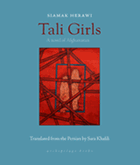
Although the subtitle declares Siamak Herawi's riveting Tali Girls to be a novel, his dedication immediately announces that two of the three girls' intertwined stories are true, transforming harrowing fiction into unbearable reality. Tali Girls, lucidly translated from the 2018 Persian original by award-winning Sara Khalili, is both a provoking exposé and wrenching homage to the girls and women of Herawi's birth country.
In 2006, the villagers in remote Tali "still have no electricity, no plumbing for water, no paved roads... no doctors, no medicine!" Despite declarations by religious leaders that children will be "corrupted" if a school is built, a year later three young girls--Kowsar, Simin, and Geesu--are among the children granted the hope of an education. Kowsar, despite fainting spells, is an "unrivaled genius." Simin, at nine, is sold to a vile, corrupt official, decades her senior. Geesu, whose raging father relentlessly beats her without cause, dares to believe in the promise of true love. The girls struggle to survive in a stifling, vicious environment debilitated by Taliban control. "Girls like me are alive but have no life. We are property," Geesu presciently observes.
Kowsar and Simin's experiences are based in reality, and the abuse that the latter faces requires strong warnings of heinously graphic violence. What prevents Herawi's writing from devolving into prurient voyeurism is a remarkable ability to delicately intertwine the horror with quotidian humanity: a father's smile, the "euphoric" taste of chocolate, the "joy and kindness" of sharing precious bread. "Read... to understand the world around you," a brave teacher once demanded of Kowsar. Audiences granted such privileged access here should obey this urgent charge. --Terry Hong

